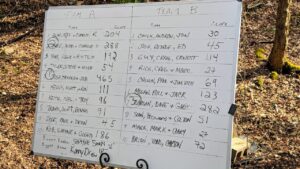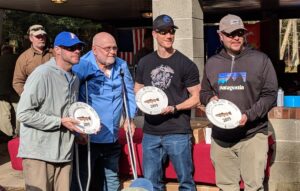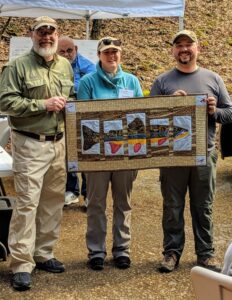NEWS & STORIES
PHWFF YELLOW CREEK TOURNAMENT IN PA CONTINUES TO GROW
Thanks to Gary Rihn, volunteer PHWFF – Erie, for writing this summary of the 3rd Annual Yellow Creek Tournament.
Sixty fly fishers met early in the morning of April 6, 2019, for the 3rd Annual PHWFF Yellow Creek Tournament, held at the Yellow Creek Trout Club near Indiana, PA.
The tournament was held to benefit Project Healing Waters Fly Fishing, a nationwide non-profit organization dedicated to helping disabled military veterans, through physical and emotional rehabilitation involving fly fishing and associated activities. Their motto is “Healing Those Who Serve”. They do this by getting them out fly fishing with other like-minded veterans, along with offering fly tying lessons, casting seminars, and educational sessions at various Veterans Administration facilities throughout the country.
Unlike previous years, where veterans fished together on two man teams against other two man teams comprised of flyfishers who paid to enter the tournament, teams this year consisted of two non-military participants and a veteran, who set out in trios to vie for top honors. The civilian fly fishers paid an entry fee to participate, while the veterans were sponsored by donations from various companies, organizations, and individuals.
 Dave Thomas, who is the Program Lead for the PHWFF Altoona Program and organizer of the event, explained the change in the team structure. “I got vets fishing with every team, so they’re not just fishing with themselves. The big thing is to get these guys to intermix with the other people, and to enjoy themselves”. Every veteran and participant, when asked, said that they liked the new format.
Dave Thomas, who is the Program Lead for the PHWFF Altoona Program and organizer of the event, explained the change in the team structure. “I got vets fishing with every team, so they’re not just fishing with themselves. The big thing is to get these guys to intermix with the other people, and to enjoy themselves”. Every veteran and participant, when asked, said that they liked the new format.
Before the tournament began, the teams randomly drew their assignments, which outlined which stretches of the stream they would fish, and at what times. Every 45 minutes, teams rotated, so that everybody had equal opportunity to fish various parts of the stream. Water conditions were nearly ideal for this year’s event. The action began early, and remained steady throughout the day. One big difference from last year was that every single team this year managed to catch and measure fish for the scoreboard, with many more total fish being caught overall.
Another noticeable difference was that with water conditions almost two feet lower than last year, it was much easier to navigate in the stream. Last year, a few teams decided to drop out early, due to either not catching fish, or falling into the chilly water. This year, every team fished through the final beat, and completed the entire tournament.
One of the participants that was forced to drop out early last year due to a fall in the cold water was Mark Dubyak. Even with that unpleasant experience, he was determined to return and participate again in this year’s tournament. When asked why he came back, his answer was simple. “It means a lot to be here today. These guys have sacrificed so much for us”.
While some participants were quite experienced, others were rather new to the sport.
Jack Merchant is a veteran in the Pittsburgh program, with less than a year of participating in Project Healing Waters Fly Fishing.
He said, “I was apprehensive about coming here today at first, cause I’m new to fly fishing. I know how competitive tournament people can get”. He soon found out how little this event had in common with the large tournaments, with everybody sharing tips, hints, and even flies, with other teams.
Another veteran new to flyfishing was Carson Wynn, of the Altoona program. “A friend told me about Project Healing Waters, so I signed up for a class cause I wanted to learn to fly fish”. He quickly felt at ease. “We spoke the same lingo, we knew the same things; it was like being back in a unit”, he said.
He added, “Military camaraderie is different than civilians. Sometimes they just don’t get us. Plus we all have some sort of ailment, physical or psychological, that we share”.
That sense of belonging, and feeling of being amongst other veterans sharing similar issues, is a major part of what makes PHWFF the success that it is. It is an opportunity to share, and to help other veterans, along with healing themselves. It is also a way to bridge generational gaps.
“I found out that the veterans from the Gulf War, and Iraqi Freedom, and Enduring Freedom, they share the same issues as us VietNam vets do”, said Wynn.
“I hesitated for a long time; I thought ‘I don’t want to mix with vets’. But since I’ve started, it’s been a wonderful experience. I can only speak as a VietNam vet. We always stewed about the past. But when we’re doing this together, we’re not stewing about the past”, added Merchant.
Both Wynn and Merchant, though being fairly new to PHWFF, feel the desire to help other vets after experiencing what PHWFF has done for them.
“We’ve got to do something about these 22 veteran suicides a day. There are suicide programs and hotlines, there are support systems, and one is Project Healing Waters”, said Wynn.
Merchant added, “I’d like to see more troubled vets not hide from things like this; that can help them. I’d also like to see more outreach to the younger vets. It works, it’s a therapy session for guys that are scared and say ‘I’m not going there’ to see a counselor”.
Steve Renosky is the owner of the Yellow Creek Trout Club where the event took place. Even though he is not a veteran, he noted, “It’s well known that a lot of these guys are coming back with PTSD. If you can get a vet on the water, even for an hour, you can get their minds off of things and let them enjoy life again”.
In addition to those who were fishing, there was a large turnout of volunteers who supported the event by serving as scorers/measurers on the stream, shuttle support driving UTV’s, centralized admin, and food preparation, amongst other duties.
Renosky also added, “From three years ago until today, what a successful event this has grown in to”.
PHWFF relies on donations and fundraisers such as the Yellow Creek tournament to be able to provide these opportunities. Veterans are not charged anything for the outings, trips, or fly tying classes where even the equipment and supplies are provided to turn out flies, many of which were used as a source of personal pride in the tournament.
 Though the Yellow Creek tournament was a personal competition, most of the outings are meant strictly as relaxation, providing camaraderie and relaxation for the veterans. It is also a time to bond and to find personal direction.
Though the Yellow Creek tournament was a personal competition, most of the outings are meant strictly as relaxation, providing camaraderie and relaxation for the veterans. It is also a time to bond and to find personal direction.
Many veterans, when asked about getting into fly fishing and involved with PHWFF, said that it had helped them immensely, and had been crucial as part of their therapy.
Merchant said, “We’re all in the same boat; we help each other with the fly tying. It has really changed how I see things. It has really changed me personally”.
Other veterans had similar stories.
“I had no discipline, but I missed the regimented life of the military. I was a boat without a dock, I was just kind of drifting around”, said Wynn, who also said that he has fished with a vet that only had one arm. It helped his sense of personal perspective when he noticed that “He could cast a fly rod and tie a fly better than I can”.
Some credited it as life changing for them. And all were deeply appreciative of those who came out both to fish with them and to volunteer, as well as the support from outside businesses that all helped to make the tournament a success.
Bob Ainsley, a non-veteran participant, was asked if anything stood out to him today. He summed up the day’s activities by saying, “Seeing the smiles on all of the veterans faces”.